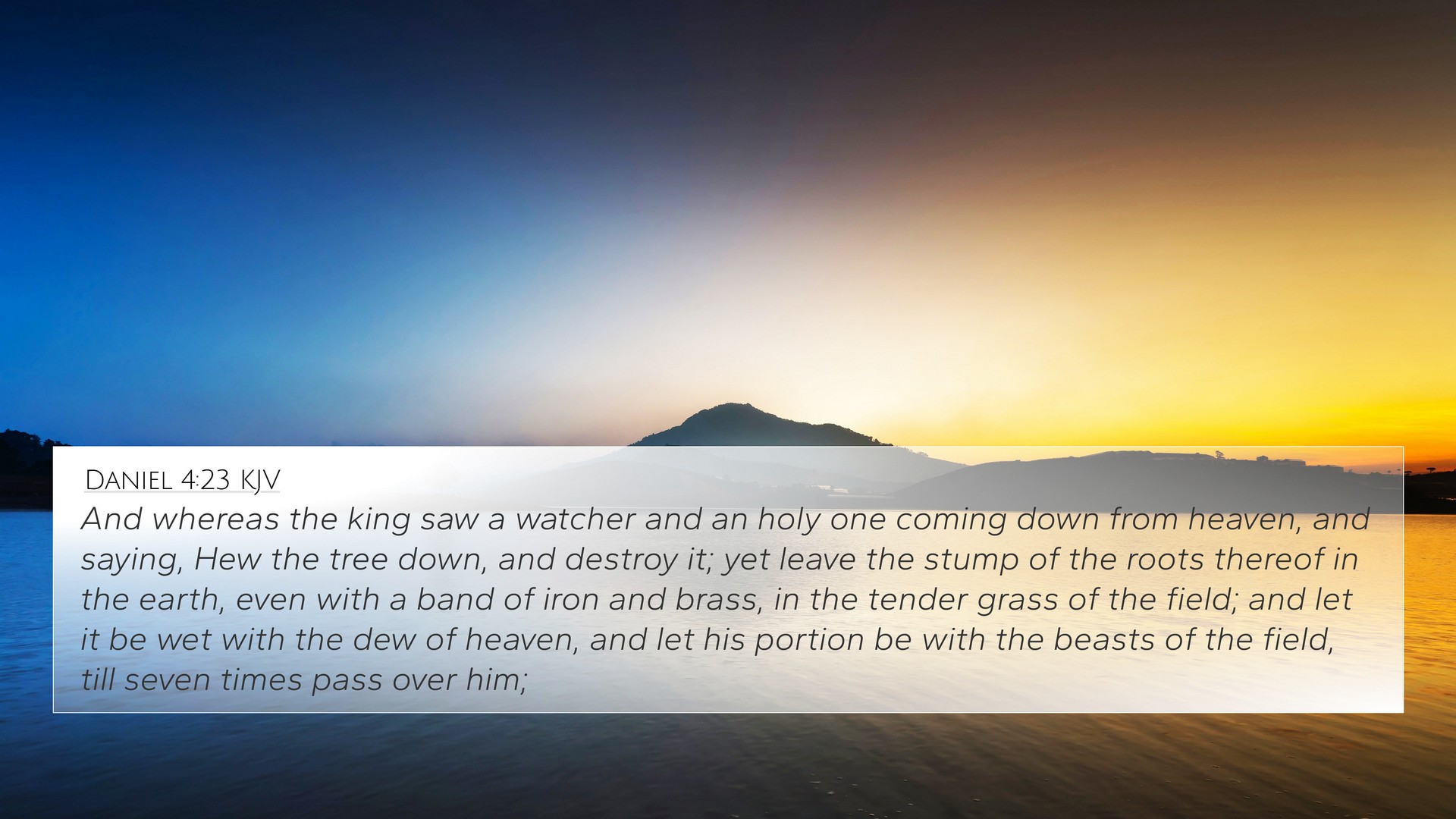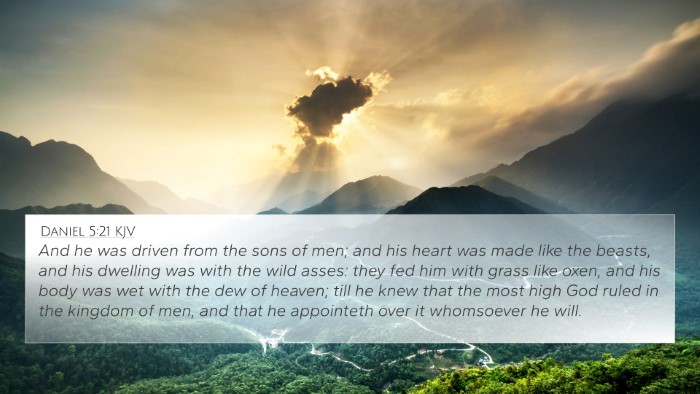Understanding Daniel 4:23
The verse from Daniel 4:23 reads: "And whereas the king saw a watcher and an holy one coming down from heaven, and saying, Cut down the tree, and destroy it; yet leave the stump of the roots thereof in the earth, even with a band of iron and brass, in the tender grass of the field; and let it be wet with the dew of heaven, and let his portion be with the beasts of the field, till seven times pass over him."
Verse Meaning and Interpretation
This verse is part of a larger narrative in Daniel, where King Nebuchadnezzar experiences a troubling dream that represents his own pride and the consequences that arise from it. The watcher and holy one—a divine messenger—announces that the king will face judgment that will humble him.
Insights from Commentaries
- Matthew Henry:
Henry emphasizes the sovereignty of God in appointing rulers and divinely intervening in their lives. The “watcher” symbolizes God’s ultimate control over earthly kingdoms, and the cutting down of the tree represents God’s judgment upon Nebuchadnezzar's arrogance.
- Albert Barnes:
Barnes highlights the implications of the “stump” that is left, suggesting that even in judgment, there is a potential for restoration and mercy. He points out that the roots signify that the king’s sanity and kingdom can be restored should he repent.
- Adam Clarke:
Clarke offers an in-depth exploration of the symbolism of the dream itself, explaining how the tree represents Nebuchadnezzar’s reign and prosperity, which will be stripped away due to his pride. He notes the importance of the decree to "cut down" but leave the stump, as a sign of hope for future restoration.
Cross-References to Daniel 4:23
- Proverbs 16:18: "Pride goes before destruction, and a haughty spirit before a fall." This illustrates the lesson of humility echoed in Nebuchadnezzar's fate.
- Isaiah 10:33-34: Discusses the symbolic acts of God in cutting down prideful nations.
- Jeremiah 51:34: Speaks to the destruction of Babylon and the judgment of those who exalt themselves.
- James 4:6: “God resists the proud, but gives grace to the humble.” This New Testament application reinforces the themes found in Daniel.
- Luke 1:52: “He has brought down the mighty from their thrones and exalted those of humble estate.” This shows the inter-biblical dialog on God's dealings with the proud.
- Ezekiel 17:22-24: A parable about a tree and its fate, similar in theme to Nebuchadnezzar's judgment.
- Matthew 5:5: “Blessed are the meek, for they shall inherit the earth,” highlighting the value of humility versus pride.
Connections Between Bible Verses
Daniel 4:23 connects to various themes throughout Scripture, including pride, judgment, and divine mercy. The humility demanded by God is highlighted through these connections, providing a rich tapestry of understanding across both the Old and New Testaments.
Thematic Bible Verse Connections
- Comparative analysis often leads to discovering the same themes echoed in different contexts within Scripture.
- The use of dreams and visions as a method through which God communicates warnings to leaders (e.g., Pharaoh in Genesis 41).
- Covenantal themes of restoration after judgment are prevalent throughout prophetic literature.
Using Bible Cross-References Effectively
To gain a deeper understanding of Daniel 4:23, one can utilize tools for cross-referencing, such as:
- Bible Concordance: Look up keywords like “pride,” “judgment,” and “tree” to find related verses.
- Bible Cross-Reference Guide: Helps to trace similar themes found across different books of the Bible.
- Cross-Reference Bible Study: Engaging in a study format that allows exploration of these connections in a group or personal setting.
How to Use Bible Cross-References
Identifying links between verses enriches the understanding of scriptures. When studying Daniel 4:23, consider:
- Finding cross-references that illustrate consequences of pride versus the rewards of humility.
- Linking this passage to instances of divine intervention in leadership throughout scripture.
- Exploring parallels between Daniel’s prophetic insights and New Testament teachings on humility and repentance.
Inter-Biblical Dialogue
Engaging with the broader biblical narrative enhances comprehension. For example, looking at how the themes in Daniel resonate within the context of the prophetic warnings given throughout both the Old and New Testaments provides a fuller picture of God's overarching plan for humanity.
Conclusion
Daniel 4:23 serves as a reminder of the consequences of pride and the sovereignty of God in the affairs of men. Through the application of cross-referencing techniques and thematic connections, one can glean profound insights into the character of God and the lessons He intends for us through the experiences of those in Scripture.




